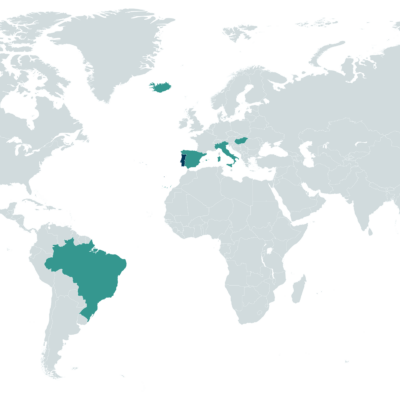Community-based change: local and traditional knowledge(s) in NbS
Call
Duration
01/04/2025 – 31/03/2028
Total grant
Approx. 1.4 mil. €
More information
Luciane Lucas dos Santos, PI
Beatriz Caitana, co-PI
Partners of the project
- Centre for Social Studies, Coimbra, Portugal
- Faculty of Life and Environmental Sciences, University of Iceland, Reykjavík, Iceland
- IESOL – Hatchery of Solidarity Economy Initiatives, State University of Ponta Grossa, Ponta Grossa, Brazil
- Teacher Treaning College / Psychology and Anthropology Department, University of Extremadura, Cáceres, Spain
- Azorean Biodiversity Group CE3C – Center for Ecology, Evolution and Environmental Changes, University of Azores, Angra do Heroísmo, Azores, Portugal
- Sintropico, São Roque do Pico, Azores, Portugal
- Department of Architecture, University of Florence, Florence, Italy
- LAPESE – Research and Extension Laboratory in Society and Emancipation, Federal Institute of Espírito Santo, Vitória, Brazil
- Arts and Communication Training Centre, Federal University of Southern Bahia, Itabuna, Brazil
- Faculty of Library Science and Communication, Federal University of Rio Grande do Sul, Porto Alegre, Brazil
- NIDES/UFRJ – Interdisciplinary Center for Social Development, Federal University of Rio de Janeiro, Rio de Janeiro, Brazil
- Faculty of Science and Informatics, Department of Economic and Social Geography, University of Szeged, Szeged, Hungary

Context
NbS have increasingly demonstrated their power to address multiple societal challenges. However, social cohesion and well-being appear as secondary to the environmental impacts of NbS, with little attention being given to the unequal distribution of benefits and adverse effects as well as to intangible values of NbS. This proposal aims to shed light on environmental justice issues underlying NbS, stressing how marginalised communities can benefit from them, even if dealing with areas threatened by (1) environmental conflicts in rural contexts (rural settlements), (2) presence of mineral wealth (indigenous lands), (3) geographic or economic isolation or (4) processes of ghettoization in lands more exposed to environmental risks and constraints, such as lack of basic sanitation or unsafe water. COMCHA departs from three hypotheses: (1) Community-based knowledge and practices can foster relevant regenerative processes in lands at permanent risk, (2) qualitative aspects associated with knowledge(s), social commitment, collective agency, sense of belonging and openness to experimentation may be of help for long-term change, and (3) collective processes towards just regeneration by underrepresented groups in NbS can challenge the prevalent sense of scale, being more connected with mobilisation for change rather than a market-based sense of productivity.
Main objectives
- 1. Identifying the plurality of practices, social dynamics, and factors associated with the community-based change both in European and Overseas countries.
- Stimulating intercultural translation between NbS experiences in Europe (being catalogued or not) and non-conventional NbS grounded on traditional, local, and peripheral knowledge(s) in Brazil.
- Mapping the NbS concepts and approaches applied to threatened communities, shedding light on community-based governance systems and forms of community economy in these threatened lands.
Main activities
- Identifying relevant practices in NbS on food system, alternative urbanism and technologies of production, considering community-based knowledges for change and their contribution towards socio-environmental and spatial justice.
- Identifying a set of features in non-conventional NbS that could potentialize the conditions for NbS implementation in threatened areas and contribute towards more encompassing evaluation and monitoring processes.
- Stimulating intercultural translation and mutual learning between non-conventional NbS outside Europe and conventional NbS within EU-funded projects.
- Providing evidence-base of the community-based communication relevance for the engagement and participation of threatened communities in the NbS implementation.

